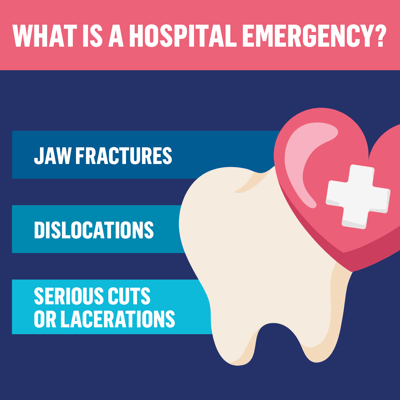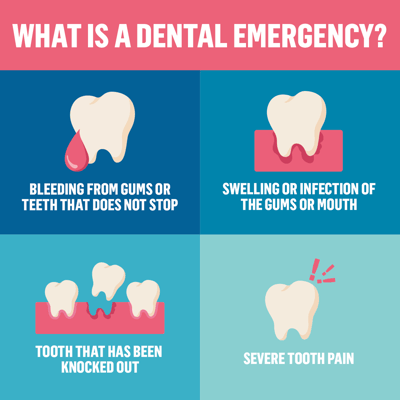Emergency and After Hours Care
What Should I Do if I Have a Dental Emergency?
If you are experiencing a dental emergency during or after business hours, contact your Primary Care Dentist or the Member Services department. The Member Services phone number is 1-866-268-9631.
Should I Go to the Hospital or Dentist for My Dental Emergency?


Advantage Dental oral health providers treat both adults and children in need of emergency or urgent dental care. However, if you are experiencing a life-threatening injury, call 911 or go to a hospital emergency room immediately. Possible life-threating oral health conditions that require immediate medical attention include:
- Risk to breathing
- Emergency medical situation that can feel like it is a mouth or tooth problem
- Risk to life from spread of tooth/gum problem or infection, such as swelling that spreads below your jawline or to your nose or upper eyelid
- Stroke; identify if one side of the face droops, if both arms can be raised in front of the body parallel to the floor or slurred speech
Common oral discomforts and injuries that may need emergency dental care and how to handle them include:
Toothache: Call your dentist or an emergency care dentist as soon as possible after you start feeling any sort of pain or discomfort that cannot be controlled by over-the-counter medication.
Broken, chipped or cracked tooth: Rinse your mouth out with warm water and apply a cold compress to your face. If there is swelling, call your dentist or an emergency dentist right away. If your tooth was chipped or broken and you have the piece of the tooth that was broken off, wrap it in wet gauze or towel and bring it with you to the dentist.
Bitten tongue, lip or cheek: Clean the area and place a cold compress on the area to reduce any swelling. If bleeding does not stop or the wound is particularly large, go to the dentist or an emergency room.
Loosened or knocked-out tooth: If your tooth becomes loose due to trauma, call your dentist right away. For a knocked-out tooth, gently insert the tooth back into the socket if possible, without touching the root, using a clean towel or washcloth. This is to give the tooth the best chance at survival. When re-inserted the tooth can re-attach itself to the bone depending on how long the tooth was out of the mouth. If the tooth is dirty, rinse with milk, but do not scrub or remove any tissue that may be attached and try not to touch the roots, this is the most sensitive and easily damaged part of the tooth. If re-insertion into the socket is not possible, put the tooth into a cup of milk or spit to keep it moist and go to the dentist immediately.
Broken jaw: Apply ice or a cold compress and go to the emergency room immediately if you suspect a broken jaw. Seek follow-up care with a dentist.
Bleeding from the mouth: Apply firm pressure to the bleeding area with a damp cloth. If bleeding continues more than an hour, go to an urgent care or an emergency department. If you have any blood or heart issues go sooner; for example if you are on blood thinners or chemotherapy, or if you are being treated for a heart stent, stroke, blood clots, or cancer. If you cannot identify the area of bleeding, seek care without waiting.

